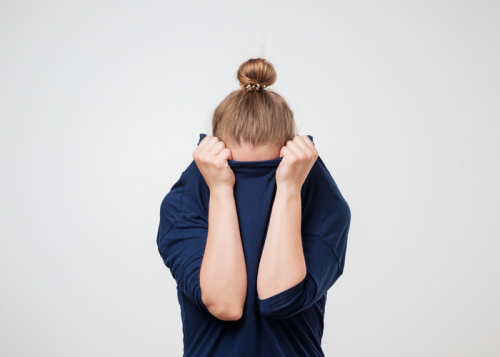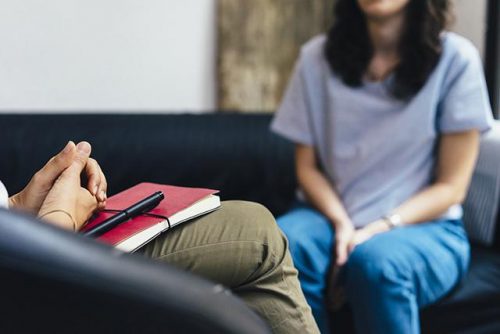
Source: myhealth1st.com
Your mental health provider is tasked to identify whether other disorders could trigger your anxiety or if you are suffering from social anxiety disorder together with another mental or physical illness.
Your provider may identify your diagnosis based on:
- A physical examination to evaluate any medical illness or medication that could cause anxiety symptoms to manifest.
- A review of the scenarios to determine whether or not they trigger your anxiety.
- A thorough discussion of your indications, their frequency, and the different situations that they occur.
- As published by the American Psychiatric Association, criteria are documented in the DSM-5 or Diagnostic and Statistical Manual of Mental Disorders.
- Self-report questionnaires regarding indications of social anxiety.
Treatment Options
Treatment is dependent on how significantly social anxiety disorder impacts your capacity to perform your daily routines. The most typical treatment for SAD includes medications, psychotherapy, or a combination of both.
First Line Medications
Numerous medicines are available on the market, but selective serotonin reuptake inhibitors or SSRIs are frequently the first lines of medications for longstanding indications of social anxiety. Your doctor or another mental health provider may prescribe sertraline or paroxetine. Serotonin and norepinephrine reuptake inhibitors (SNRI) such as venlafaxine are also preferable for social anxiety disorder.
To decrease the negative side effects, your healthcare provider may give you medications at low doses and slowly increase them to a full dose. It could also take a few weeks or months of medication therapy to alleviate or improve your symptoms.
Your healthcare provider can also recommend other types of medications for indication of social anxiety, including:
- Anti-anxiety Medications. Benzodiazepines may lower your anxiety levels. They have been proven to work rapidly, but they can also be sedating and addictive, so they are usually prescribed only for a brief period.
- Some Antidepressants. Perhaps you already tried taking some antidepressants and choose which one is more effective for you with the least number of side effects as well.
- Beta-Blockers. These medications work by inhibiting the rousing effect of adrenaline, which is a form of epinephrine. They can potentially lower blood pressure, reduce shaking of the limbs and voice, or decrease heart rate. For this reason, it is advisable to limit its use to specific situations, such as when giving speeches. Beta-blockers are not advisable for treating generalized anxiety disorder.

Source: newsroom.uw.edu
Psychotherapy
Psychotherapy enhances symptoms in most individuals with SAD. Going through therapy, you are taught to identify and alter negative thought patterns about yourself and learn skills to increase your self-esteem, especially in social events. Cognitive-behavioral therapy is the most recommended form of psychotherapy used for anxiety. It can be likewise effective when done either in groups or individually.
Home Remedies And Lifestyle Changes
SAD commonly needs the aid of a certified psychotherapist or another medical expert. Still, you can try doing some of these strategies in dealing with situations that are most probably going to trigger SAD symptoms.
- Stay physically fit regularly.
- Learn techniques on how to decrease or alleviate stress.
- Maintain a balanced and healthy diet.
- Get sufficient sleep.
- Limit or avoid caffeine and alcohol.
- Participate in social events by going out with those that you feel safe and comfortable with.
Taking Smaller Strides
First, think about your fears so that you can determine the situations that can trigger your anxiety. Slowly learn these activities, get accustomed to them until they no longer cause you too much anxiety. Start with smaller strides by creating daily and then weekly goals in circumstances that are not very overwhelming. The more you learn and practice, the less tense you become.
Also, try to practice these situations:
- Compliment someone you meet you talk today.
- Have a meal or snack with someone close to you, like a close friend or significant other.
- Intentionally make eye contact when you greet others or try to greet someone first.
- Ask directions from a stranger.
- Reach out to a salesperson to ask for help about finding something in a store.
- Call a close friend to talk about weekend plans.
Prepare Yourself For Social Events
Initially, being sociable when you are socially anxious is quite perplexing. As hard or overwhelming as it would seem at first, do not try to avoid circumstances that cause your anxiety symptoms. By habitually confronting these kinds of circumstances, you will eventually build and enhance your coping strategies for anxiety in social situations.
Support And Coping

Source: rawpixel.com
These coping mechanisms might help alleviate your anxiety:
- Regularly seek help and companionship with family and friends.
- Try joining a group that provides opportunities to enhance public speaking and communication skills, like Toastmasters International. You can also be a member of a reliable online support group.
- Do interesting and enjoyable activities, like hobbies and sports, when you feel stressed or anxious.
Conclusion
In time, these coping mechanisms and the rest of the treatments mentioned above will help you control your triggers and your symptoms and hopefully prevent you from having a relapse. Do not forget that you can overcome your anxious moments, that your social anxiety disorder is brief, and that the unpleasant outcomes that you are so anxious about will not take over your life if you decide to take control and practice positivity.
